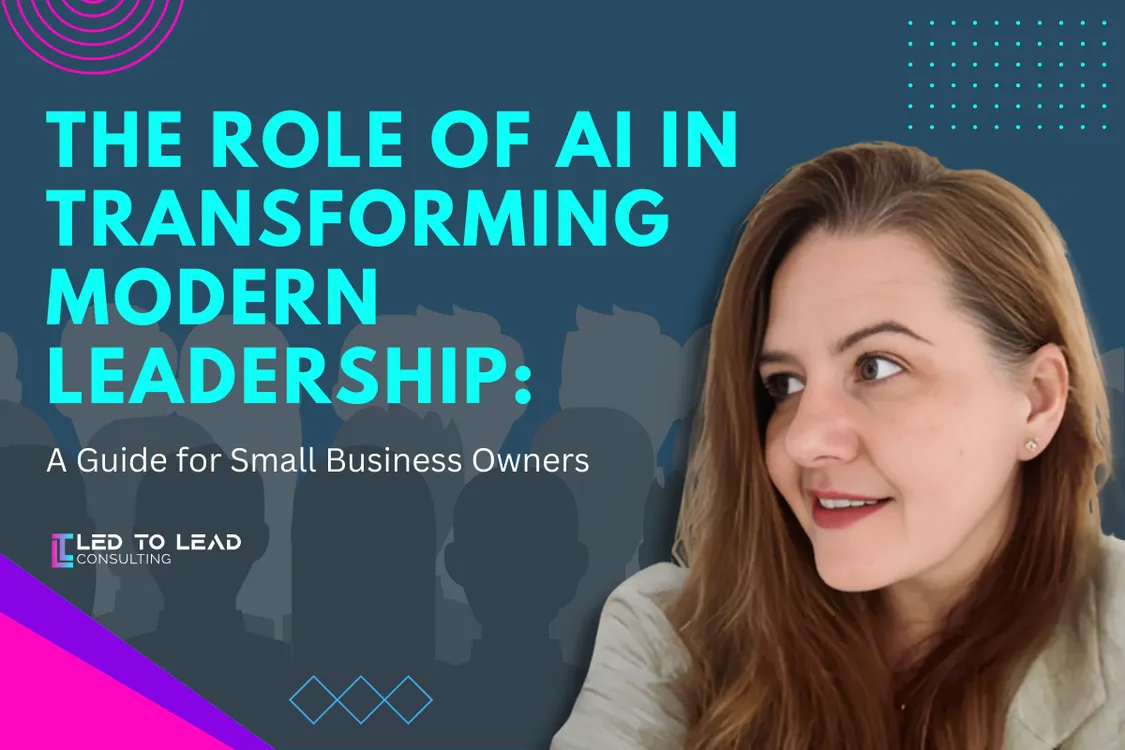
The Role of AI in Transforming Modern Leadership: A Guide for Small Business Owners
As artificial intelligence (AI) rapidly evolves, it’s becoming more than just a buzzword: it’s reshaping the landscape of leadership. For small business owners across all industries, AI is changing how leaders approach decision-making, manage teams, and foster innovation. Let’s explore AI’s impact and how it can enhance leadership in small businesses.
1. AI Enhances Decision-Making for Leaders
One of the most profound ways AI is transforming leadership is by enabling more data-driven decision-making. Small business owners often face the challenge of making high-stakes decisions with limited resources. AI can help by analyzing large sets of data to provide actionable insights that lead to smarter, faster decisions.
For example, AI tools can process historical sales data, customer behaviors, and market trends to predict future outcomes and recommend strategic actions. Whether it’s optimizing inventory levels or launching a marketing campaign, AI empowers leaders with information that was once out of reach. This data-driven approach can reduce decision fatigue, allowing leaders to focus on creative and strategic aspects of their business (World Economic Forum).
Moreover, AI systems, like machine learning algorithms, can assist in risk assessment. By evaluating various courses of action and their potential consequences, AI enables leaders to anticipate challenges and minimize risks (Doodle).
2. Improving Team Management with AI
AI isn’t just about automation or big data; it’s also revolutionizing team management. Small business owners often juggle multiple roles, and managing teams efficiently is critical to maintaining productivity. AI-powered tools can streamline workflows, improve communication, and enhance collaboration within teams.
For instance, AI can be integrated into communication platforms, offering real-time language translation, which facilitates smoother collaboration in diverse teams. Tools like Slack or Trello, which leverage AI, help automate mundane tasks like meeting scheduling and project tracking, freeing up time for leaders to focus on strategic concerns.
Additionally, AI can play a role in evaluating team performance. By analyzing key performance indicators (KPIs) and employee engagement data, AI offers insights that help leaders identify strengths and weaknesses in their teams. This allows for more tailored approaches to team development, improving overall performance.
3. AI Drives Innovation and Creativity
Contrary to the fear that AI stifles creativity, it can actually drive innovation. AI excels at identifying patterns and trends that humans might overlook. For example, AI can suggest novel solutions to problems, propose product improvements based on customer feedback, or highlight new market opportunities. Leaders can leverage these insights to fuel creativity within their teams and inspire new product or service ideas (MTD Training).
AI tools can also enhance the creative process by reducing the burden of repetitive tasks. For instance, AI can automate marketing campaign analysis, customer segmentation, or even content generation, giving leaders more time to focus on strategic vision and business growth.
4. Creating a Collaborative and Ethical AI Culture
Leaders in the AI age must balance technology with human judgment. While AI provides valuable insights, it lacks emotional intelligence, empathy, and ethics. Small business owners need to ensure that AI is used as a complementary tool rather than a replacement for human decision-making.
This is especially important in areas like customer service, where human interaction is key. AI can handle routine inquiries, but leaders should ensure that more complex or sensitive issues are managed by humans to maintain trust and customer loyalty.
Additionally, integrating AI into a business requires a focus on ethics. AI algorithms must be transparent and free of bias, ensuring that decisions (whether they’re about hiring, promotions, or customer service) are fair and inclusive. Leaders who prioritize ethical AI use are not only protecting their businesses from legal and reputational risks but are also building stronger, more trustworthy relationships with their customers and employees (Berkeley Exec Ed).
5. AI and Continuous Learning for Leaders
To thrive in this AI-driven era, small business leaders must stay curious and commit to continuous learning. Understanding AI’s capabilities, limitations, and ethical considerations is crucial. Leaders who embrace AI are more likely to foster a culture of innovation and agility within their teams.
Furthermore, it’s important to develop AI literacy across your organization. Training employees on how to use AI tools can unlock their full potential and help teams become more autonomous, innovative, and efficient.
Conclusion
AI is not about replacing leadership but enhancing it. For small business owners, AI offers opportunities to make more informed decisions, streamline team management, and foster innovation. However, AI’s successful integration requires a balanced approach: leveraging its strengths while maintaining human judgment, empathy, and ethical standards.
As AI continues to evolve, it will undoubtedly become a powerful ally in leading small businesses. Leaders who embrace AI as a tool for growth, creativity, and ethical decision-making will be better positioned to navigate the complexities of the modern business landscape.
Looking to integrate AI into your small business? Start with free AI-powered tools like Grammarly for writing assistance or explore the innovative strategies offered by Launch for leadership transformation.


